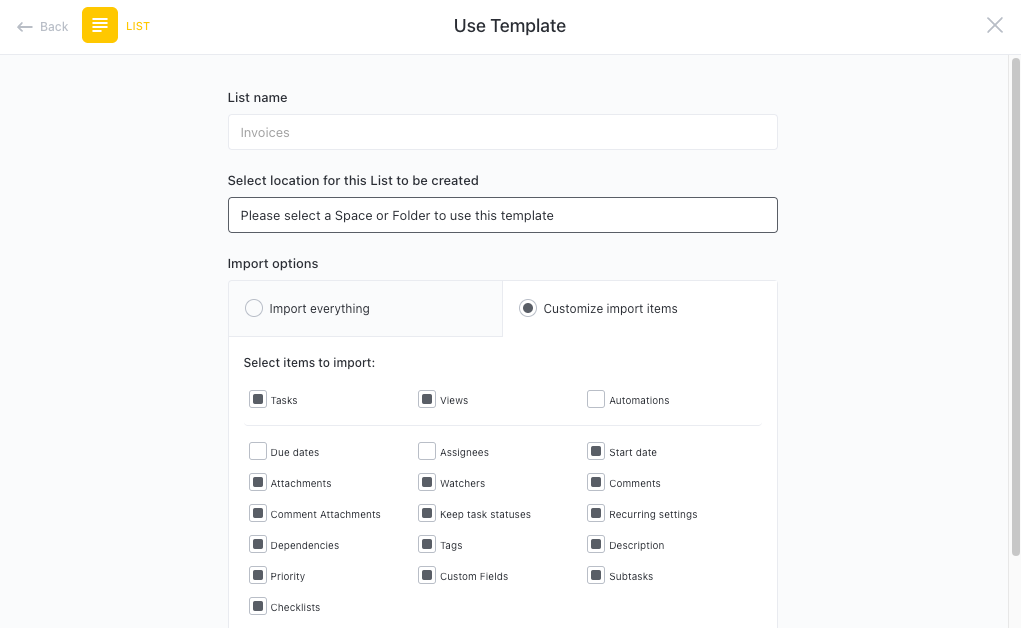When it comes to solving crimes and bringing justice, effective coordination and communication among criminal investigators is crucial. That's where ClickUp's Criminal Investigators Meeting Agenda Template comes in handy.
With this template, you can easily outline the purpose, topics, and objectives of your meetings, ensuring that every team member is on the same page and equipped with the information they need to move investigations forward.
This template helps you:
- Coordinate efforts and share important updates on ongoing cases
- Streamline communication to ensure effective collaboration
- Keep track of action items, deadlines, and follow-ups
Stay organized and focused on the task at hand with ClickUp's Criminal Investigators Meeting Agenda Template. Start using it today and see the difference it makes in your investigations.
Benefits of Criminal Investigators Meeting Agenda Template
The Criminal Investigators Meeting Agenda Template is a valuable tool for law enforcement agencies and criminal investigators. Here are some benefits of using this template:
- Streamline communication and coordination among team members
- Ensure all important topics and objectives are discussed during the meeting
- Provide a clear structure and timeline for the meeting, maximizing efficiency
- Facilitate information sharing and updates on ongoing investigations or cases
- Improve overall organization and productivity of the meeting
- Enhance collaboration and brainstorming among team members
- Serve as a reference document for future meetings and follow-ups
- Increase accountability and ensure follow-through on action items
Main Elements of Criminal Investigators Meeting Agenda Template
ClickUp's Criminal Investigators Meeting Agenda Template is designed to help you efficiently plan and conduct your investigative meetings.
This Doc template includes:
- Custom Statuses: Use different statuses to track the progress of each agenda item, such as To be discussed, In progress, and Completed.
- Custom Fields: Add custom fields such as Case Number, Investigator Name, Date, and Topic to provide important details for each agenda item.
- Different Views: Access multiple views to organize and present your meeting agenda, including a Table view for a structured overview, a Calendar view to schedule the meetings, and a Board view for a visual representation of the agenda items.
With this template, you'll be able to streamline your investigative meetings and ensure no important topics are overlooked.
How to Use Meeting Agenda for Criminal Investigators
Ensure every criminal investigation meeting is productive and efficient with these six simple steps:
1. Set the meeting objective
Before the meeting, determine the specific objective you want to achieve. Are you reviewing case updates, discussing new leads, or brainstorming strategies? By clearly defining the purpose of the meeting, you can keep the discussion focused and ensure everyone is on the same page.
Use the Goals feature in ClickUp to set the objective and share it with all meeting participants.
2. Prepare the agenda
Create a detailed agenda that outlines the topics to be discussed and the time allocated for each item. Include any relevant documents or reports that need to be reviewed during the meeting. This will help keep the conversation organized and ensure that all necessary information is covered.
Use the Board view in ClickUp to create a visual agenda with different columns for each agenda item.
3. Assign pre
-meeting tasks
To maximize productivity, assign tasks that need to be completed before the meeting. This could include reviewing case files, analyzing evidence, or conducting research. By distributing the workload ahead of time, you can ensure that everyone comes prepared and ready to contribute.
Use the Recurring Tasks feature in ClickUp to assign pre-meeting tasks and set deadlines for completion.
4. Conduct the meeting
During the meeting, follow the agenda and encourage active participation from all attendees. Provide updates on ongoing investigations, discuss any challenges or roadblocks, and collaborate on potential solutions. Keep the conversation focused and ensure that everyone has an opportunity to share their insights and concerns.
Use the Automations feature in ClickUp to automate meeting reminders and notifications to ensure everyone attends the meeting on time.
5. Document meeting minutes
After the meeting, document the key takeaways, decisions, and action items discussed. Share the meeting minutes with all participants to ensure that everyone is aligned on the next steps and responsibilities. This will help track progress and hold individuals accountable for their assigned tasks.
Use the Docs feature in ClickUp to create a meeting minutes document and collaborate with team members in real-time.
6. Follow up on action items
Monitor and follow up on the action items assigned during the meeting. Ensure that each task is completed within the designated timeframe and provide any necessary support or resources to facilitate progress. Regularly communicate with the team to provide updates and address any challenges that may arise.
Use the Dashboards feature in ClickUp to track and visualize the progress of each action item and ensure that all tasks are being completed on time.

Get Started with ClickUp’s Criminal Investigators Meeting Agenda Template
Criminal investigators and law enforcement agencies can use the Criminal Investigators Meeting Agenda Template to streamline their meetings and ensure efficient collaboration and information sharing.
First, hit “Add Template” to sign up for ClickUp and add the template to your Workspace. Make sure you designate which Space or location in your Workspace you’d like this template applied.
Next, invite relevant members or guests to your Workspace to start collaborating.
Now you can take advantage of the full potential of this template to conduct productive meetings:
- Use the Meeting Agenda View to outline the purpose, topics, and objectives of each meeting
- Assign tasks to team members to ensure everyone is prepared and accountable
- Attach relevant documents or evidence to the agenda items for easy reference
- Set due dates for each agenda item to keep the meeting on track
- Use the Discussion View to capture important notes, decisions, and action items during the meeting
- Create follow-up tasks to address any unresolved issues or action items
- Monitor and analyze meeting outcomes to improve future investigations and collaboration.








